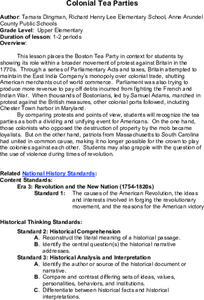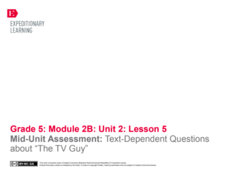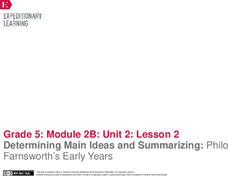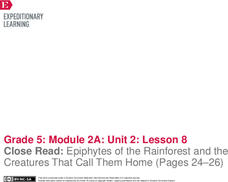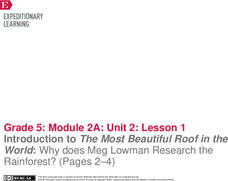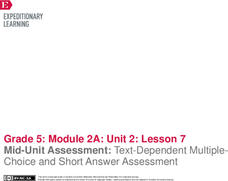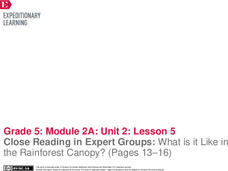Center for History Education
Was the Stamp Act Fair?
Pledge your loyalty to the king and the Stamp Act or sign an oath against the tax. After simulating an in-class tax for school supplies, young historians consider the reasons for the Stamp Act and similar colonial policies. The...
Center for History Education
Who Burned the Peggy Stewart?
Not all Patriots were on the same page against the British before the Revolutionary War. While some wanted to use peaceful means, such as debate and petition, others used violence, such as burning ships carrying British tea. Using...
Center for History Education
Colonial Tea Parties
Most people know of the Boston Tea Party, but it was only one of similar protests throughout the colonies. Using a case study from Maryland, learners explore primary sources, including images and newspaper accounts of similar tea...
Center for History Education
Pontiac's War
Invaders are coming: fight them off or run? Native American peoples had to decide this question after British colonists went west following the French and Indian War. Using a speech from Chief Pontiac, young historians consider if they...
Center for History Education
Native American Gender Roles in Maryland
Toss gender roles out the window—some societies lived in a world where women not only possessed the family wealth but also were the farmers and butchers. Many Native American societies had more gender equity than European societies....
EngageNY
Mid-Unit Assessment: Text-Dependent Questions about “The TV Guy”
Say hi to the TV guy. Readers finish their mid unit assessments by reading The TV Guy and answering text-dependent questions. Learners complete multiple choice as well as short and long answer questions pertaining to comprehension,...
EngageNY
Making Inferences: What Motivated Philo Farnsworth?
Learners continue their work in The Boy Who Invented TV by examining pages 14-17. They work together to determine the gist of the section during a first read then complete a second read to make inferences, create a summary, and...
EngageNY
Determining Main Ideas and Summarizing: Philo Farnsworth’s Early Years
Teamwork makes the dream work! Learners work in groups to analyze pages 2-9 of The Boy Who Invented TV, The Story of Philo Farnsworth. They complete a first read to determine the gist and a second read to identify main idea and...
EngageNY
Building Background Knowledge: The Boy Who Invented TV, “Life before Philo”
Walk through the pictures to understand the text. Scholars analyze The Boy Who Invented TV: The Story of
Philo Farnsworth by taking a book walk and looking at the pictures. They then do a first read of Life before Philo to...
EngageNY
Informational Text Features: Analyzing “Hawaii’s Endangered Happy Face Spider”
Some things are better the second time around. Scholars reread an article about Hawaii's happy face spider, answering text-dependent questions as they read. Then, they use a Venn diagram to compare the text features of interviews and...
EngageNY
Mid-Unit 3 Assessment: On-Demand Note-Taking about Howler Monkeys
Get the facts straight. Scholars complete their mid-unit assessment by reading a text, watching a video, and observing a picture about howler monkeys. They take notes about the facts they discover to use in future lessons.
EngageNY
Close Read: Epiphytes of the Rainforest and the Creatures That Call Them Home (Pages 24–26)
It's all connected. Scholars use pages 24-26 of The Most Beautiful Roof in the World to identify the relationship between the plants and animals in the rainforest. They answer and discuss questions about the relationship with a...
EngageNY
Supporting an Opinion: Why is the Rainforest Canopy a Difficult Place to Research? (Pages 9–10)
What do you think? Readers focus on pages 9-10 of The Most Beautiful Roof in the World to form opinions about the difficulty of researching the rainforest canopy. They begin by discussing the skills required to be a scientist and...
EngageNY
Introduction to The Most Beautiful Roof in the World: Why does Meg Lowman Research the Rainforest? (Pages 2–4)
Let's go for a walk. Scholars take a book walk through the text The Most Beautiful Roof in the World and create an anchor chart to list the features of informational text. They then take a close look into the character Meg Lowman by...
EngageNY
Conducting Research: Asking and Answering our Questions about Rainforest Arthropods
Let's ask an expert. Scholars divide into groups to research and become experts on either ants or butterflies. Learners use task cards and text on their topic to complete a note catcher. At the end, they share their information with a...
EngageNY
Taking Notes and Citing Quotes from Text: Gathering Information on our Rainforest Insects
In other words. Scholars practice using paraphrasing and quotes. They partner in pairs to write a paraphrase for an information text strip. Individuals then use their skills to paraphrase information from the text Fire Ants.
EngageNY
Analyzing How Rainforest Scientists Communicate Their Research (Pages 39–42)
How do you say that? Learners read pages 39-42 of The Most Beautiful
Roof in the World to analyze how the rainforest scientists communicate their research. They record their ideas in a KWL chart and then work in groups to explain...
EngageNY
Interviewing Meg Lowman: What Does it Mean to be a Responsible Scientist? (Pages 37–39)
Can I ask you something? Scholars read about the night walk on pages 37-39 of The Most Beautiful Roof in the World. After discussing the text with their group, they work together to create interview questions they would ask Meg...
EngageNY
Comparing Two Main Ideas in an Informational Text: Meg Lowman’s Methods for Researching the Rainforest (Pages 35–36)
Alike or different? Scholars compare and contrast the research methods used by Meg in The Most Beautiful Roof in the World. They record information about her research in a three column note catcher before answering text-dependent...
EngageNY
Reading for Details: Taking an Inventory in the Rainforest (Pages 28–31)
Take inventory. Scholars analyze pages 28-31 of The Most Beautiful Roof in the World and use a note catcher to model how Meg Lowman took inventory of the species in the rainforest. Learners then take a close look at the vocabulary...
EngageNY
Mid-Unit Assessment: Text-Dependent MultipleChoice and Short Answer Assessment
Shout it from the rooftops. Scholars take a mid-unit assessment of their reading thus far in The Most Beautiful Roof in the World. Learners answer multiple choice, short answer, and fill in the blank questions relating to pages...
EngageNY
Reading Informational Text for Details: Meg’s Rainforest Experiment (Pages 17–20)
Take good notes. Scholars record information in their note catcher sheets as the teacher reads aloud pages 17-20 of The Most Beautiful Roof in the World. Learners then reread parts of the text in groups and rotate to share the notes...
EngageNY
Close Reading in Expert Groups: What is it Like in the Rainforest Canopy? (Pages 13–16)
Put it together piece by piece. Scholars read pages 13-16 of The Most Beautiful Roof in the
World by dividing it into chunks. They analyze each chunk for gist and word meaning. Individuals then create a matching game by writing...
EngageNY
Close Reading: Blue Creek, a Rainforest in Belize (Page 12)
Peace and quiet. After reading page 12 of The Most Beautiful Roof in the World, scholars participate in a silent conversation with a chalk talk activity. They take turns describing how the rainforest is diverse by writing on chart...


